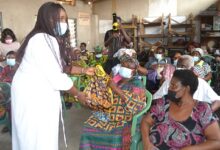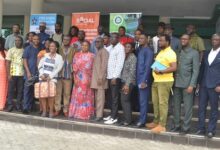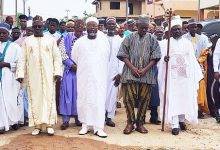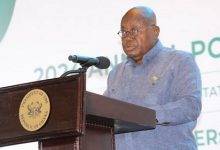
The Chief Executive of the Ghana National Petroleum Corporation (GNPC), Dr Kofi Kodua Sarpong, has called on universities in the country to collaborate with industry to carry out research into the areas of development that feed into the well-being of the state.
He explained that, applied research have a stronger impact on industries and ultimately the livelihoods of people because it focuses on research that seeks to solve specific problems of society.
“In effect, therefore, the two entities, universities and industries, share a common goal. That is why they should collaborate for greater impact on society,” he said
Dr Sarpong was speaking at the opening of the 10th biennial congress of the Kwame Nkrumah University of Science and Technology (KNUST) Alumni Association at Cape Coast
The congress, which was attended by members of the association drawn across the globe, was on the theme: “Teknocrats; the critical partners in restoring, accelerating and sustaining Ghana’s industrialisation”.
Dr Sarpong stated the need for the universities to collaborate with some organisations to come up with practical solutions to address the needs of the nation through research, saying “I have seen KNUST collaborating with industry to build a cocoa inputs factory on the Kumasi-Konongo road. More of such ventures are needed to advance Ghana’s industrialisation drive.”
He said, if such joint ventures were well run, the university could make money for itself, pointing out that, the collaboration should be grounded in targeted research, stating that, “Industries need sound academic research for innovation and improvement of products for consumption.”
Dr Sarpong said it was not enough for universities to run to industry just for funds;
“there is no corporate organisation that will not give off substantial money, if it is benefiting from such gesture.”
He urged management of KNUST to start inculcating the spirit of entrepreneurship in all areas and said young graduates needed to find innovative ways of using acquired skills.
He said: “The Kwame Nkrumah University of Science and Technology can set part of its internally generated fund to give students the opportunity to develop business proposals for start-ups and compete for small grants.”
He underscored the need for the institution to strengthen its internship engagement in order for the students to benefit tremendously, explaining that, the universities must officially seek placements and structure the internship period to benefit both the students and industry.
The Head of Local Government Service, Dr Nana Ato Arthur, in his presentation, urged members of the alumni not to place their personal or sectional interest above the national and general interest.
The government, he said, had mustered the needed political will to embark on the second wave of industrialisation and indicated that, the preoccupation of Ghanaians should be how the idea could be translated into a reality, adding that, “the skills acquired from KNUST should be used to add value to our agricultural products, create decent work and livelihood for our people.”
Dr Arthur further said: “We should be concerned about the legacy we will eventually leave behind, whether the bridge, road and house we construct, the procurement we superintend and other critical decisions taken will stand the test of time”.
The Global President of the KNUST Alumni Association, Madam Eunice Akosua Ofosua Amoako, in an address, commended members of the association for their support in the development of their alma mater.
The Paramount Chief of the Oguaa Traditional Area, Osaberima Kwesi Atta II, who was the chairman for the opening ceremony, called for the adoption of technology and innovation as the nation strives to industrialise.
From David O. Yarboi-Tetteh, Cape Coast







